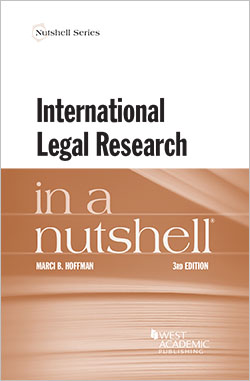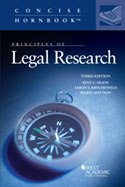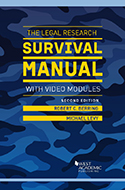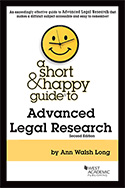
International Legal Research in a Nutshell
Author:
Hoffman, Marci B.
Edition:
3rd
Copyright Date:
2021
25 chapters
have results for international law
Chapter 4. Treaties and International Agreements 37 results (showing 5 best matches)
- International courts are very useful for interpretation and analysis of treaties. Useful sources include international law yearbooks,
- The International Law Commission (ILC) is the body responsible for codifying written international law (treaties). Therefore, the ILC website contains draft documents, commentary, and other relevant
- Before delving into treaties too deeply, a few words about U.S. treaties and agreements are in order. Domestically, treaties to which the U.S. is a party are equivalent in status to Federal legislation, forming part of what the Constitution calls ‘the supreme Law of the Land.’
- Keep in mind that some jurisdictions always require domestic implementing legislation. There is a great deal of scholarship about concepts called monism and dualism. Basically, monists believe that international law does not need to be translated into national law. Dualists state that international law is not directly applicable domestically. This is a great simplification of these concepts. For more information, see Dinah Shelton,
- Treaties can be referred to by a number of different names: international conventions, international agreements, covenants, final acts, charters, protocols, pacts, accords, or constitutions for international organizations. Usually, these different names have no legal significance in international law. Treaties may be bilateral (between two parties) or multilateral (among several parties) and are usually only binding on the parties to the agreement. An agreement “enters into force” when the terms for entry into force specified in the agreement are met. Bilateral treaties usually enter into force when both parties agree to be bound as of a certain date.
- Open Chapter
Chapter 1. Introduction and Basic Concepts 61 results (showing 5 best matches)
- Private international law governs the choice of law when there are conflicts in the domestic law of different countries that relate to private transactions between individual parties. In the U.S., Canada, and England, this general area is known as conflict of laws. National laws are the primary sources of private international law. However, private international law is also embodied in public international law sources, especially treaties and conventions (for example, the aptly named Hague Conventions on Private International Law
- The study of international law is quite ancient. So long as ships have sailed the seas and nations have traded, warred, and made agreements, there has been a need for international law. Because there is no governing power that stands above the nations of the world, international law has developed over time as a series of compromises. Thus international law is much more blurry around the edges than the law of any nation.
- Soft law encompasses non-binding documents or instruments (such as guidelines, declarations, and principles) that may be politically significant but that are not enforceable. Not that any international law is really enforceable, but soft law does not even have the pretense of being more than aspirational. Soft law has been effective in international economic law
- In the past few decades, the role of international law has changed dramatically. The increasing pace of globalization has moved international law to center stage. Some law schools have integrated international or transnational features into their curricula by adding components to the regular first-year courses; some now require a specialized course on transnational or international law; and more and more schools are offering a wide range of classes on international topics. Even a lawyer who intends to spend her life practicing law in her home state will find international issues impinging on her work. These developments combine to make basic international legal research a necessary skill for every lawyer. The need for this Nutshell grows every day.
- Public international law governs the relationships between national governments, the relationships between intergovernmental organizations, and the relationships between national governments and intergovernmental organizations. It regulates governments and intergovernmental organizations across national boundaries. In the older world of international law, before the development of world markets and the dizzying variety of international and transnational bodies of today, public international law was the primary focus of research. While it is still important, today it is only the beginning.
- Open Chapter
Chapter 5. Customary International Law and General Principles of Law 60 results (showing 5 best matches)
- According to Article 38(1)(b) and (c) of the International Court of Justice Statute, customary international law and general principles of law are two of the major sources of international law. Neither of these “sources of law” will sound familiar to a non-specialist. But if you consider the matter for a second, they are natural locations for authority in international law. Nations have been dealing with each other for millennia. For all of the faults that one can find with international law, an amazing amount of international law has worked fine for centuries. Travel, trade, communications, and diplomacy, the list could go on and on. It makes sense that some of these deep-rooted concepts have taken on the force of law. Perhaps no one can pinpoint when a custom began, or when it became accepted. The important point is that it is accepted as the governing rule.
- A country’s domestic laws also provide evidence of international custom because they indicate the State’s practice and obligations. To research the law of other countries, see Chapter 3 of this Nutshell. Because locating the laws relevant to international law can be a daunting task, you should use a
- “The basic notion is that a general principle of international law is some proposition of law so fundamental that it will be found in virtually every legal system. When treaties and customary international law fail to offer a needed international rule, a search may be launched in comparative law to discover if national legal systems use a common legal principle. If such a common legal principle is found, then it is presumed that a comparable principle should be attributed to fill the gap in international law.”
- International law digests are another useful source. Digests aid in locating customary international law contained in diplomatic papers of States. The easiest to access are the digests for the U.S. For historical information, there are many digests covering the late 19th century and the 20th century: Cadwalader,
- For more assistance with researching customary international law and general principles, try using another guide called “Researching Customary International Law, State Practice and the Pronouncements of States regarding International Law.”
- Open Chapter
Chapter 2. Some Basics as You Begin 25 results (showing 5 best matches)
- There are many classic works in international law, and these are good places for the novice to get familiar with the framework of this topic. Some of the most highly regarded include Ian Brownlie,
- Dictionaries and encyclopedias help the researcher locate definitions and general descriptions of international and foreign legal terms and concepts. They can provide necessary context and background when one is working in an unfamiliar area. Remember that knowing the terrain is vital. Even elementary background sources can be a huge help. The very best source for information on international law is the
- Dictionary of International and Comparative Law
- law.
- The United Nations (with the support of HeinOnline) provides a freely available collection of scholarly writings on a variety of international law topics. This collection includes works from some of the most important international law scholars, like Ian Brownlie, Hersch Lauterpacht, and others.
- Open Chapter
Chapter 8. United Nations 45 results (showing 5 best matches)
- The Audiovisual Library of International Law
- International Law Commission (ILC), which focuses on the progressive development and codification of international law; and
- United Nations Commission on International Trade Law (UNCITRAL), the core legal body in the field of international trade law.
- The U.N. documentation system is a massive enterprise, and the legal researcher will never touch many of the documents issued by the U.N. An excellent overview of the legal materials issued by the U.N. is contained in the research guide “United Nations Documentation: International Law.”
- Max Planck Yearbook of United Nations Law
- Open Chapter
Chapter 11. Source Collecting and Cite Checking 50 results (showing 5 best matches)
- Note: International commercial arbitration and investor-state arbitration come up a lot when source collecting for international law journals. Consult a research guide for more guidance, such as Berkeley Law Research Guide: “International Commercial Arbitration.”
- Law students are often asked to collect sources and to check citations for a journal or as a professor’s research assistant. These activities are very similar to normal research in international law, but the product of your research efforts will be more focused and tailored to the person who created the assignment. Though research problems are never exactly the same, we thought that it would be useful to provide an overview of how to go about source collecting and cite checking. We will give you some
- Use Foreign Law Guide
- The following steps outline the process for locating international and foreign legal sources. Keep in mind that this is general guidance and may not work for every source. In this section, we will assume that you are source collecting and cite-checking an article for your law school journal.
- Case law from international courts and tribunals
- Open Chapter
Appendix A. Comprehensive List of Sources 246 results (showing 5 best matches)
- International Committee of the Red Cross, International Humanitarian Law Bibliography,
- Researching Customary International Law, State Practice and the Pronouncements of States regarding International Law,
- Researching Public International Law: Treatises,
- State Practice and International Law Journal
- Cumulative Digest of United States Practice in International Law
- Open Chapter
Chapter 6. International Case Law 57 results (showing 5 best matches)
- Most other collections of decisions focus on particular topics, like arbitration, trade law, human rights, and international criminal law. Some collections provide access to national court opinions on these international law topics. Here’s a sampling of a few topical collections:
- Annual Digest of Public International Law Cases and Annual Digest
- Judicial decisions are the bread and butter of research for the American legal researcher. The same is not true for research in international law. Since there is no single source of authority to enforce the judgments of an international court or tribunal, international case law has never been as central to the research enterprise. As globalization continues to increase, the role for international decision-making bodies has grown in response.
- The WorldLII International Courts & Tribunals Collection is a website that provides searchable access to the decisions of many international courts and tribunals.
- Cambridge Law Reports is another database containing international law cases. Coverage includes the cases from
- Open Chapter
Chapter 9. Other International Organizations 23 results (showing 5 best matches)
- The term “international organization” refers to an organization established by a treaty or other instrument governed by international law and possessing its own international legal personality. International organizations may
- Yearbook of International Organizations
- For more information on the intricacies of international organizations, see Philippe Sands, Pierre Klein, & D.W. Bowett eds.,
- Kirsten Schmalenbach, “International Organizations or Institutions, General Aspects” in
- A recent addition to the tools for researching international organizations is the Oxford International Organizations (OXIO) database.
- Open Chapter
Chapter 3. Foreign and Comparative Law 92 results (showing 5 best matches)
- International Law Reports
- The focus of this Nutshell is researching international law. Though international law is distinct from foreign and comparative law, I recognize that those doing international legal research often end up doing some foreign legal research as well. While research in comparative law used to be the province of academic writers, there is a greater interest in comparing laws and procedures than ever before. Therefore, it makes sense to cover it in this book as well, and I will address researching foreign and comparative law in this chapter. The field of foreign law is a vast one, so be forewarned that I will not go into great detail for any specific country. My goal will be to provide some basic strategies for locating and researching the domestic law of another country—also known as foreign law—with a bit of comparative law research advice in the section that follows.
- Searching the web for comparative law surveys or databases can be quite fruitful. Law firms and international organizations post many useful reports and documents. For example, the World Bank has a very good background paper on anti-discrimination laws in the developing world.
- Chapter 6 of this Nutshell focuses on researching international case law and includes some topical sources that contain domestic cases. See also Appendix B for selected websites and databases for foreign law.
- Be on the lookout for subject compilations, digests, and websites that cover your topic. Often, these sources use words like “world” or “international” in the title. Subject compilations such as
- Open Chapter
Chapter 13. Staying Ahead of the Curve 36 results (showing 5 best matches)
- videos. You may want to search for a specific international law expert or a law school to help you locate some of the better videos. Don’t know who the experts are? Try the U.N.’s Audiovisual Library of International Law.
- Yes, these still exist. Bloomberg Law
- The editors of the European Journal of International Law offer another forum for
- “A casual stroll into the unwieldy world of International Law,
- This blog covers conflict of laws (or private international law) around the globe. It covers research, cases, publications and more.
- Open Chapter
Chapter 10. Commentary and Analysis 30 results (showing 5 best matches)
- Using bibliographies as a research tool may seem old school; however, these lists of books and articles can be a good way to start your research. Oxford Bibliographies provides encyclopedia-like entries on various subjects within international law as well as annotated bibliographies of sources for further
- Max Planck Institute for Comparative Public Law and International Law Catalog.
- If researching international law is new to you, consider starting your research with sources that contain commentary and analysis—books, articles, working papers, and other secondary sources. Reviewing commentary and analysis early in the research process will provide you with an introduction to an unfamiliar topic; provide citations to relevant laws and documents; allow you to gain an understanding of the terms of art and other vocabulary; and keep you abreast of new legal developments. Gaining command of the context of your research is important in any field. But on questions of international law, where intuition may lead you down the wrong path, context is of special importance.
- best commentary and analysis, i.e. the very contextual material that you need for international research, is primarily in print or in electronic equivalents available in subscription databases. Projects like Google Books,
- Let’s look at LSN more closely. LSN is part of the Social Science Research Network (SSRN), which also includes networks for accounting, economics, finance, and many more topics. Assume that you are looking for recent scholarship on “pandemics and international law” (very topical at the time of updating this Nutshell). A simple search by title, abstract, or keywords on LSN retrieves several useful working papers and forthcoming articles on various international law issues related to pandemics (human rights, travel restrictions, state responsibility, and international health law). It will also provide you with other useful search terms, such as Coronavirus, COVID-19, World Health Organization, and global health. In fact, this search produces a bibliography of sources called “COVID-19
- Open Chapter
Chapter 12. General Research Strategies 17 results (showing 5 best matches)
- What do you think you need to locate? Is there relevant primary law that you need to locate, such as a treaty or international agreement, national legislation, or case law? Do you need to locate facts such as dates or names? This will determine your direction—it is crucial.
- Note any citations to international and foreign laws, including case law.
- Primary sources are the law—statutes, case law, regulations, treaties, etc. When researching foreign and international law, keep in mind that each legal system is a snowflake in that no two are exactly the same. We guide you to sources that will help you find out the sources in each system. Be sure to use them.
- You may need non-legal information, such as dates, statistics, and economic or political data. Once again, the indexes and secondary source material discussed in the various chapters of this Nutshell will help you out. A good journal article in a non-legal publication might provide invaluable background. International law exists in the world of international politics and relations. Consult
- Keep in mind that there are not always electronic databases to check for updates to laws of other jurisdictions. Indeed, most jurisdictions do not have equivalents to Shepard’s or Keycite. American legal information is by far the most developed; do not assume that other countries or international bodies have similar research tools. The internet allows the researcher to do some incredible research, but the variation in available research tools is stunning.
- Open Chapter
Index 45 results (showing 5 best matches)
Preface 2 results
Appendix C. Web Treaty Collections 19 results (showing 5 best matches)
Outline 25 results (showing 5 best matches)
Appendix B. Websites Containing National Law 35 results (showing 5 best matches)
Abbreviations and Acronyms 18 results (showing 5 best matches)
Chapter 7. European Union 40 results (showing 5 best matches)
- This should be the first database consulted since it contains a variety of documents: treaties, international agreements, legislation in force, legislation in preparation, case law, and parliamentary questions. Like other parts of EUROPA, access to this collection of documents is also free.
- European Current Law: Monthly Digest
- A website called N-Lex (“a common gateway to national law”) is available from the EU.
- The Foundations of European Union Law: An Introduction to the Constitutional and Administrative Law of the European Union
- http://eur-lex.europa.eu/collection/eu-law/eu-case-law.html
- Open Chapter
Acknowledgments 1 result
- I wish to thank Gus Tupper and Luke Miller (supported by the Miller Institute for Global Challenges and the Law) for their essential help making sure the manuscript is readable and that the links work. Not to mention correcting many of my mistakes. They are two of the many students who have asked me questions and listened to my lectures over the years. I wouldn’t know as much about international legal research if you all hadn’t bothered to take an interest. I also wish to thank Jay Miller for tolerating an open laptop at nights and weekends and my constant whining almost every evening.
- Open Chapter
Title Page 3 results
Center Title 1 result
West Academic Publishing’s Emeritus Advisory Board 15 results (showing 5 best matches)
- Professor of Law Emeritus, University Professor of Law Emeritus, University of Michigan
- Professor of Law, Chancellor and Dean Emeritus University of California, Hastings College of the Law
- Professor of LawUniversity of Houston Law Center
- Dean and Joseph L. Rauh, Jr. Chair of Public Interest LawUniversity of the District of Columbia David A. Clarke School of Law
- Professor of Law, University of Houston Law Center
- Open Chapter
- Publication Date: May 7th, 2021
- ISBN: 9781684675845
- Subject: Legal Research
- Series: Nutshells
- Type: Overviews
-
Description:
This Nutshell provides a basic introduction to international and foreign legal research for the non-specialist. It offers guidance through the unfamiliar pathways of research using international and non-US legal materials and demystifies the world of treaties and international case law. Since it’s aimed at the non-specialist, it provides straight-forward background information on the United Nations and the European Union and includes guidance using the documents and legal materials of these institutions. There are extensive links to the rich world of Web resources, but it also describes print research tools that remain important in this field. It also sets out a road map for approaching a research problem involving international, foreign and comparative law. Finally, there is information on keeping current on new information and resources as well as tips for how to do handle source collection and cite-checking an international law journal article.
Additional teaching materials are available for this title, and include online links to research sources noted in the book:



